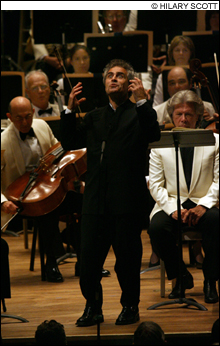
the job of unsettling the audience — and he
did. |
Great symphony orchestras don’t just play at home; they tour and make recordings. The Berlin Philharmonic has over the past 50 years made innumerable recordings for Deutsche Grammophon and EMI, and it tours regularly. (It will visit Boston in November as part of the Celebrity Series.) The Boston Symphony Orchestra hasn’t had a recording contract that amounted to much since RCA dropped it in the ’60s, and the last international tour was in 2001, under principal guest conductor Bernard Haitink.
Now, however, music director James Levine is leading the BSO on a two-week (August 26–September 7), 10-concert whirl through Europe that’ll take it to Lucerne, Hamburg, Essen, Düsseldorf, Berlin, Paris, and London. On the various bills: Bartók’s Concerto for Orchestra, which the BSO commissioned back in 1943, and his opera Duke Bluebeard’s Castle; Berlioz’s cantata La damnation de Faust; Brahms’s Symphony No. 1; Ravel’s Piano Concerto in G, with soloist Pierre-Laurent Aimard; Charles Ives’s Three Places in New England; and Elliott Carter’s Three Illusions. It’s an ambitious tour that will put “Jimmy’s BSO” under the international critical spotlight: the orchestra will be playing at the Philharmonie in Berlin, inviting comparison with the BPO, and at the Royal Albert Hall in London. Whether it’ll help with a recording contract is another matter. Perhaps the BSO should follow the lead of the London Symphony Orchestra and the San Francisco Symphony and the Chicago Symphony Orchestra and establish its own label.
At Tanglewood last weekend, the orchestra closed out its 2007 summer season with two of the programs it’ll present in Europe: Duke Bluebeard’s Castle with the Brahms First on Friday and La damnation de Faust on Saturday. Both were performed at Symphony Hall this past season, Bluebeard/Brahms in November and Faust in February, but Bluebeard and Faust make for a intriguing back-to-back, since each is about an “innocent” woman.
In the libretto Béla Balázs wrote for Bartók’s 1911 work, Judith is not the “guilty” wife of Charles Perrault’s 1697 tale who unlocks the door to Bluebeard’s forbidden room and discovers the bodies of his previous wives. She defies her family to marry Bluebeard and come to his gloomy castle, and once there, she entreats him to open, one by one, the seven locked doors in his castle. Behind the first six are revealed a torture chamber, an armory, a treasury, a garden, a kingdom, and a lake; we seem to be passing from darkness into light, but there’s blood everywhere, even on the roses in the garden, and the lake is formed from Bluebeard’s tears. An increasingly distraught Judith guesses what’s behind the seventh door, but she’s wrong: his previous wives are alive, locked away in his castle/brain, figments of his imagination, and when he pushes her inside and relocks the door, she joins them in living death.